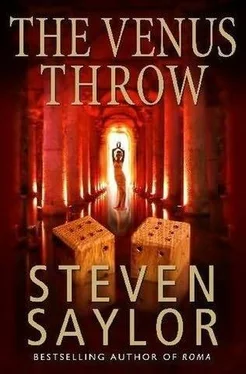Steven Saylor - The Venus Throw
Здесь есть возможность читать онлайн «Steven Saylor - The Venus Throw» весь текст электронной книги совершенно бесплатно (целиком полную версию без сокращений). В некоторых случаях можно слушать аудио, скачать через торрент в формате fb2 и присутствует краткое содержание. Жанр: Исторический детектив, на английском языке. Описание произведения, (предисловие) а так же отзывы посетителей доступны на портале библиотеки ЛибКат.
- Название:The Venus Throw
- Автор:
- Жанр:
- Год:неизвестен
- ISBN:нет данных
- Рейтинг книги:3 / 5. Голосов: 1
-
Избранное:Добавить в избранное
- Отзывы:
-
Ваша оценка:
- 60
- 1
- 2
- 3
- 4
- 5
The Venus Throw: краткое содержание, описание и аннотация
Предлагаем к чтению аннотацию, описание, краткое содержание или предисловие (зависит от того, что написал сам автор книги «The Venus Throw»). Если вы не нашли необходимую информацию о книге — напишите в комментариях, мы постараемся отыскать её.
The Venus Throw — читать онлайн бесплатно полную книгу (весь текст) целиком
Ниже представлен текст книги, разбитый по страницам. Система сохранения места последней прочитанной страницы, позволяет с удобством читать онлайн бесплатно книгу «The Venus Throw», без необходимости каждый раз заново искать на чём Вы остановились. Поставьте закладку, и сможете в любой момент перейти на страницу, на которой закончили чтение.
Интервал:
Закладка:
"Oh yes, that would be very good," said Dio, staring at her with an odd expression. Philosopher he might be, but hunger and homesickness can addle the mind of any man.
Suddenly Diana appeared at Bethesda's side. Dio looked more con-fused than ever as he gazed from mother to daughter. Their resemblance is striking.
Bethesda departed as abruptly as she had appeared. Diana lingered for a moment and seemed to mimic her mother's scowl. The longer I live with a woman the more mysterious the experience becomes, and now that there are two of them in the household, the mystery is doubled.
Diana turned on her heel and followed her mother with the same quick, haughty stride. I looked at my guests. In comparison to comprehending a woman, I thought, comprehending another man-even a philosopher in a stola or a gallus who had given up his sex-was really not so difficult.
The serving girl brought us wine and some crusts of bread to stave off our hunger until the meal was ready. A chill had crept in from the garden, so I called on Belbo to stoke the brazier while I closed the shutters. I glanced outside and saw that twilight had descended on the atrium, casting the face of Minerva into inscrutable shadow.
With more wine in his stomach, as well as a bit of bread, Dio at last found the fortitude to recount the events which had reduced him to such a state of uncertainty and fear.
Chapter Four
Best to begin at the beginning," sighed Dio, "insofar as that's possible with such a twisted tale. You know something of the story already — " "Refresh my memory," I said. "Very well. All my life, Alexandria has been in constant political upheaval. The members of the royal Ptolemy clan wage unending warfare against each other. For the people of Alexandria, this has meant bloody massacres and crushing taxes. Time and again the people have risen up to drive ruler after ruler out of the capital. One Ptolemy goes into exile, another takes his place-I won't recite the list. Whoever is winning occupies Alexandria, with its great granaries and royal treasury. Whoever is losing flees to Cyprus and plots his return. Fortunes reverse and the rulers change places, while the people endure. I forget which Ptolemy was on the throne when you were in Alexandria, Gordianus-"
"Alexander, I believe."
"Yes, that's right; a couple of years later he was chased out of the city by an angry mob and died in suspicious circumstances. Then Alexander's brother Soter took the throne. Eight years later Soter died, leaving no legitimate sons. That was twenty-four years ago."
Dio put his fingertips together. "The only legitimate male heir of Ptolemaic blood was Soter's nephew, named Alexander like his father. He happened to be residing here in Rome at the time of Soter's death, under the dictator Sulla's protection; this is where Rome first enters the story. Backed by Roman diplomacy-and by funds borrowed from Roman bankers-Alexander II returned to Egypt to claim the throne. To do so he had to marry his aunt, Soter's widow, because she refused to step down as queen. Marry her he did-and summarily murdered her. The queen had been well liked. Her death ignited the fury of the mob."
"The same mob which rioted over the death of a cat?" Trygonion sniffed. "I shudder to imagine what they did over the murder of a popular queen!
"You anticipate the story," said Dio, slipping into his lecturing voice. "Alexander II then announced a rise in taxes so that he could repay his Roman backers. That was the final spark. Nineteen days after he ascended the throne, the new king was dragged from the royal palace and murdered by the mob. They tore him limb from limb."
It was tales such as this which Romans like to cite to make themselves feel proud of the relative civility of our republic. As a young man I had admired the Alexandrians' passion for politics, though I could never accustom myself to their propensity for sudden, extreme violence. Alexandrian healers peddle a poultice with the Egyptian name "cure-for-a-human-bite-which-draws-blood," and most households keep a sup-ply on hand-a fact which says much about the Alexandrians.
"Now we come to the beginnings of the current crisis-the Egyptian situation, as you call it, Gordianus. After the brief and inglorious reign of their cousin Alexander II, two of Soter's bastards came forward to press their claim for the throne."
"Brave men!" quipped Trygonion.
"One bastard took Cyprus. The other took Egypt, and has since reigned for twenty years-proof that a man can keep himself on a throne without possessing a single kingly virtue. His full name in the Greek" — Dio took an orator's breath- "is Ptolemaios Theos Philopator Philadelphos Neos Dionysos."
"Ptolemy, God: Father-Lover, Brother-Lover, the New Dionysus," I translated.
Dio curled his lip. "In Alexandria, we simply call him Ptolemy Auletes-the Flute-Player."
"The Piper!" Trygonion laughed.
"Yes, King Ptolemy the Piper," said Dio grimly, "whose only known accomplishment is his skill on the flute, which he loves to play day and night, sober or drunk. He stages choruses in the royal palace and plays the accompaniment. He debuts his own compositions at diplomatic dinners. He organizes contests and pits his talent against common musicians. How did Egypt ever deserve such a ruler? He epitomizes and exaggerates all the baser qualities of his decrepit line-indolent, self-indulgent, luxury-loving, licentious, lazy… "
"He should have been a gallus rather than a king," laughed Trygonion.
Dio looked at him sidelong. "I am compelled to agree with you."
"I remember something Cicero said about him in a speech," I said. " 'Nearly everyone agrees that the man who occupies the throne of Egypt today neither by birth nor in spirit is like a king.' And there are those who say the Piper's reign is illegitimate and always has been, because of a will that was made by his unfortunate predecessor."
"Ah, yes, and there you put your finger upon the heart of the matter," said Dio. "Shortly after the death of Alexander II at the hands of the mob, from the very start of King Ptolemy's reign, a rumor began to circulate to the effect that Alexander II had left a will, bequeathing all of Egypt to the Senate and people of Rome."
Trygonion raised his eyebrows. "A splendid prize! The granaries! The treasure house! The crocodiles! But surely no one could believe such a tale. Such generosity is preposterous."
Dio sighed, exasperated. "You show your ignorance of both politics and history, gallus. Preposterous as such an idea may be, it is not without precedent. Attalus of Pergamum bequeathed his kingdom to Rome over seventy years ago; it became a province of the empire and to this day supplies the people of this city with subsidized grain. Forty years ago Apion left Cyrene to Rome; Apion was a Ptolemy and Cyrene was once a part of Egypt. And less than twenty years ago Bithynia was left to Rome by its last king."
"But why would any king do such a thing?" asked Trygonion.
"To save his country from the bloodshed of a disputed succession; to spite his presumptive heirs; to protect his people from being conquered by rival kingdoms even more oppressive than Rome; to bow to the tide of Roman expansion." Dio sighed. "In my lifetime, Rome has gained Pergamum, Cyrene and Bithynia by inheritance, and Pontus and Syria by conquest. Two years ago Rome seized Cyprus without a skirmish; King Ptolemy's brother committed suicide. Rome has overrun the East. Of all the kingdoms that grew out of the empire of Alexander the Great, only one remains: Egypt."
"And now the rumors are circulating again, about a will made by Alexander II bequeathing Egypt to Rome," I said. "King Ptolemy's sleep must be uneasy."
Trygonion nodded sagely. "I wouldn't care to be the slave who has to change his bed sheets."
Читать дальшеИнтервал:
Закладка:
Похожие книги на «The Venus Throw»
Представляем Вашему вниманию похожие книги на «The Venus Throw» списком для выбора. Мы отобрали схожую по названию и смыслу литературу в надежде предоставить читателям больше вариантов отыскать новые, интересные, ещё непрочитанные произведения.
Обсуждение, отзывы о книге «The Venus Throw» и просто собственные мнения читателей. Оставьте ваши комментарии, напишите, что Вы думаете о произведении, его смысле или главных героях. Укажите что конкретно понравилось, а что нет, и почему Вы так считаете.










